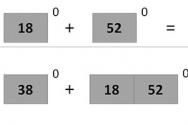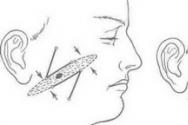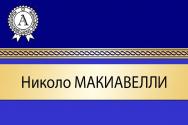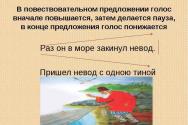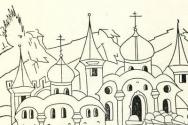Chichikov - The new hero of the era. Essay: “Chichikov is the new hero of the era” in the poem by N.V.
Mr. Chichikov, as a new hero of the era, fully reflected a unique phenomenon in Russian life - the emergence of the bourgeoisie. And yet, being a typical hero of the original capitalist system, Chichikov revealed a completely new, revolutionary type in Russian literature, which became immortal. You can meet the “Chichikovs” everywhere: in any country, and in any era.
Universal type of scammer
Can Chichikov be called a hero of his time, like Pechorin? Without a doubt. But, if the image of Chichikov - a rogue and a cunning man - was new to Russian literature, it was not to European literature. In Spanish literature, back in the second half of the 16th century, a new genre appeared - the picaresque novel. His heroes, like a distorting mirror, were contrasted with the heroes of noble “chivalrous novels”, their sublime deeds and aspirations. The appearance of such a hero is also associated with changes in the production and economic structure of Spain, just as the appearance of the hero Chichikov is associated with the decline of the slave-owning farming system in Russia. And the new hero was fully in keeping with the times, both in Spain and in Russia. This is a scoundrel, a rogue and a swindler who does not disdain meanness and lies to everyone: officials, ordinary people, nobles and scammers like himself.
Common features of scammers in literature
The origin of swindlers in European literature is usually very vague, as is the origin of Chichikov, whose parents: “were nobles, but public or private - God knows,” and Gogol does not mention his mother at all. There are no remarkable features in their portraits, otherwise they could be identified and revealed. Here is the main character of the poem " Dead Souls“The author describes Pavel Ivanovich as neither fish nor fowl: “not handsome, but not bad-looking, neither too fat nor too thin; I can’t say that I’m old, but I can’t say that I’m too young.” The main motivation for Chichikov's actions also coincides with the motivation of his brothers in European literature of the picaresque novel genre: immediate gain and a rich life in the future.
You have to laugh at evil
At the very end, Gogol, without hesitation, compares Chichikov with Napoleon, who was kept in prison and then released “from the island of Helena, and now he is making his way to Russia, supposedly Chichikov, but in fact not Chichikov at all.” It is precisely this comparison of the ruler of the world with Chichikov - a swindler, a petty swindler - that is the main innovation of N.V. Gogol. He seems to be telling us that it is in the hands of “chichikovs” of all stripes, in the hands of these small and unscrupulous people that the control of the world is now concentrated. Chichikov absorbed and immediately devalued all the features of a romantic hero.
It is Chichikov who is the symbol of the “new money” so despised at all times. Chichikov is to some extent nouveau riche, but, to his credit, he may well be a collective image of the ancestors of the now respected Rothschilds and Rockefellers. And it’s unlikely that Chichikov ever looked like absolute evil. Because even evil in his image is reduced and turns into a farce.
Chichikov symbolizes the advent of a new time: a time of incredibly dexterous, cunning, resourceful, energetic people, not burdened by the moral code of chivalry, but obsessed with the idea of acquisition and profit. At the same time, Chichikov is a conservative; progress and the needs of humanity are alien to him. People like him always care only about themselves. And in the end, is Chichikov’s type really so far from our modern times? Who knows.
Our article will help you write the essay “Chichikov - Hero of the Era” when preparing homework, will reveal the character’s image and allow us to better understand the motives of Chichikov’s actions in the light of the historical transition from serfdom to capitalism.
Work test
Chichikov is new
hero of the era
- V. Kozhinov: “Chichikov is a truly strong personality...”
- P. Weil: “Chichikov’s mediocrity, dullness... limitedness is his main feature. Small man with little passions"
- A.I. Herzen: “One active person is Chichikov, and that is a limited rogue”
- V.G. Marantsman: “Chichikov, different from the landowners, is also a dead soul. The “brilliant joy of life” is inaccessible to him
- N.V. Gogol: “It would be fairer to call him: owner, acquirer”
- biography of Chichikov, the story of his adventures; Understand: - what are the reasons for the hero’s actions;
- what influenced the formation of Chichikov’s personality;
Evaluate the characteristics and actions of the hero, analyze the text of the poem “Dead Souls” (chapter 11); draw conclusions, prove your point of view.
"College Advisor Pavel
Ivanovich Chichikov,
landowner, in his own way
Necessities."
“An excellent actor with the ability to pretend, be a hypocrite, adapt to people in order to benefit” M.A. Belyaev)
How did Chichikov show himself in public service?
Start of service
“He got an insignificant place, a salary of thirty or forty rubles a year...”
Thanks to his iron will and ability to deny himself everything, while maintaining neatness and pleasant appearance, he managed to stand out among the same “nondescript” employees.
“Chichikov was the complete opposite in everything, both with his somber face, the friendliness of his voice, and his complete non-drinking of any strong drinks.”
Career advancement
To advance in his career, he used an already tried method - pleasing his boss, finding his “weak spot” - his daughter, whom he fell in love with.
Chichikov became a “famous man”
Serving on the commission "to build
some state-owned capital building,” began to allow himself “certain excesses”
Namely: good goods, good shirts, expensive fabric for suits, purchasing a pair of horses...
Service failures
- Lost a “warm” place
Why did Chichikov have to leave the commission?
- He pulled off a risky operation (transporting contraband), in which he first got rich, and then got burned and lost almost everything.
Work in customs
- “And in anticipation of the best, I was even forced to take up the title of attorney.”
This is how the idea of acquiring “dead souls” came about.
thrift
delicacy
hoarding
deceit
tight-fistedness
Imagining myself
Kherson
landowner
Manilov
in a bag
Box
Collects
all sorts of rubbish
Plyushkin
In cash
greedy in affairs,
unyielding
Sobakevich
Capable
Nozdryov
Who is Chichikov?
- A businessman (who successfully, without ever being stingy with money, conducts business).
- Acquirer (seeking to acquire things, values, and enrichment).
- Entrepreneur (enterprising and practical).
- Scoundrel (mean person, scoundrel).
1. “Look, Pavlusha, study, don’t be stupid and don’t act out, but most of all please your teachers and bosses. If you please your boss, then, even though you don’t have time in science and God hasn’t given you talent, you will put everything into action and get ahead of everyone.”
2. “Don’t hang out with your comrades, they won’t teach you any good; and if it comes to that, then hang out with those who are richer, so that on occasion they can be useful to you.”
3. “Do not treat or treat anyone, but behave better so that you will be treated, and most of all, take care and save a penny: this thing is the most reliable thing in the world.”
4. “A comrade or friend will deceive you and in trouble will be the first to betray you, but a penny will not betray you, no matter what trouble you are in.
You will do everything and ruin everything in the world with a penny.”
Qualities that contributed to career growth and enrichment
- Knowledge of human psychology
- The ability to do something at the right time
- Ability to plan a profitable business
- The ability to conduct business from the “row” of unclean ones
- Ability to carry on a conversation and make a good impression
- The ability to easily incarnate
- The ability to find an approach to everyone
- The ability to show oneself as a person of good taste
“Take it away
on the road with you...
all human movements
Do not leave
them on the road
You won’t get up later!”
Reflection
- It was interesting to me…
- I realized today that...
- What would you call the lesson?
- What was the most important thing in the lesson?
- What did we want to find out?
- What did we find out?
- What is useful in life?
- Gogol's poem, which became very popular. It was not only read and read with pleasure, but also filmed more than once. Many phrases have become catchphrases, and the characters have become symbolic. In the work we meet the hero Chichikov. Let's write an essay on work Dead Let’s analyze Chichikov’s soul and figure out who he is: is he a new hero of the era or its anti-hero.
Already at the beginning, the author introduces us to the portrait characteristics of Chichikov. Chichikov was neither old nor young, not outwardly handsome, but not bad-looking either. He is neither fat nor thin. In a word, the average person who is not alien to the desire for profit and who wants beautiful life. If in other works the heroes are superfluous people of the era where they live, then Chichikov fits into the era very well. It fits into life where people live who are not financially poor, but they are spiritually poor. Among them, the hero does not stand out and appears before us an ordinary person of its time.
Is Chichikov a new hero or anti-hero?
Is Chichikov a new hero of his time? Without a doubt. But he is not only a hero, but also an anti-hero.
Reading the work, we see the birth of a new generation with worthy qualities, but the generation was brought up according to old views. So people like Chichikov were born. They try to enrich themselves by any means, look forward and go towards the goal, although due to their spiritual emptiness they cannot evaluate what is happening soberly. Therefore, the intoxication of profit dominates their minds. People are starting to burn out. But as soon as they lose everything, the heroes sober up. People of the new era cannot be guided by their mind, soul and heart at the same time. They are captured by their passions, unable to simply live. Greed usually takes over and people’s souls simply become dead, like the souls of Manilov, Plyushkin, Sobakevich and other characters.
Why is Chichikov an antihero? Reading the work, we see the spiritual degradation of people. Yes, Chichikov does not bring harm in spiritual terms; in society, the death of souls naturally occurs, since the experienced order is difficult to eradicate. But the hero harms himself, because he goes through life with a moral: you will do everything and conquer everything in the world with money. At the same time, Chichikov finds an excuse for himself, because everyone does this. Having such principles, our hero himself deadens his soul. No, you cannot call him a criminal of his age, he is only one of those who represents the new generation. He is not a complete miser who only thinks about money. He also dreams of a family, and we cannot condemn him for wanting to live better and in abundance, because we ourselves strive for this. That's just a different question. Is it possible to build your well-being with the help of lies, hypocrisy, and deception without harming your spiritual world. I think it's a rhetorical question, which doesn't need an answer.
At the literature lesson we got acquainted with the work of N.V. Gogol "Dead Souls". This poem gained great popularity. The work was repeatedly filmed both in the Soviet Union and in modern Russia. Also, the names of the main characters have become symbolic: Plyushkin is a symbol of stinginess and storage of unnecessary things, Sobakevich is an uncouth person, Manilovism is immersion in dreams that have no connection with reality. Some phrases have become catchphrases.
The main character of the poem is Chichikov. Chichikov's portrait is different from other residents of the city. He is not handsome, but not bad-looking, not too fat, not too thin, not old, but not young either. The author classifies him as a “mediocre gentleman.” But still, Chichikov liked everything in his appearance to be noble, because... appearance is one of his main weapons. At first he wore a lingonberry-colored tailcoat, but by the end of the poem he changes it to a European-style jacket. This can be explained by the fact that he feels a change in his position in society. His status has grown, so now he needs to look different. He tried to flatter people with high ranks and did not allow rudeness in conversation, but with his equals or with lower ranks he behaved proudly. All the heroes spoke of him as a decent person, even “Sobakevich, who rarely spoke on the good side of anyone,” called him “a very unpleasant person.”
Chichikov's origins are “dark and modest.” It is not known whether he is a nobleman, a pillar or a personal one. He spent his childhood in a small house, without comrades, friends, with a sick father. The father constantly forced his son to learn to read and write, and raised him according to the principle “don’t lie, listen to your elders and carry virtue in your heart.” When the father sent his son to school, he gave him the instruction: “Look, Pavlusha, study, don’t be stupid and don’t hang around, and most of all please the bosses with your teachers. Hang out with those who are richer, so that on occasion they can be useful to you. Better behave in such a way that you will be treated, and most of all, take care and save a penny: this thing is more reliable than anything in the world.” Chichikov followed his father’s instructions and was very successful in this matter. As a result, he grew up to be an egoist whose greed knows no bounds.
At school, he pleased the teacher, as his father instructed, and graduated with good grades. Chichikov also succeeded in commercial affairs. He denied himself everything and sold his comrades their own treats, after which he showed initiative different ways and began to earn good money from it. For him, a penny became higher than any human relationship. When his former comrades collected money to help a teacher in trouble, Chichikov made the excuse of not having enough and was ready to give only a nickel of silver. Thus began his hoarding policy.
In the service, Chichikov found an approach even to the most unapproachable boss. He has a keen sense of human nature and is a good artist. All this helps in work. I would also like to note his patience. Not everyone is willing to wait that long to achieve their goal, given all the ups and downs that Chichikov experienced. I would like to talk about his service at customs. At the beginning he pretends that he came to serve with good intentions. His superiors promote him, and then he sets about his true goals. But due to carelessness, he involves his friend in this matter. Afterwards, allowing himself to be stupid, he manages to quarrel with him. And in the end they report each other to their superiors.
- The work of Nikolai Vasilyevich Gogol fell on the dark era of Nicholas I. It was the 30s. XIX century, when reaction reigned in Russia after the suppression of the Decembrist uprising, all dissenters were persecuted, the best people were persecuted. Describing the reality of his time, N.V. Gogol creates the poem “Dead Souls”, which is brilliant in its depth of reflection of life. The basis of “Dead Souls” is that the book is a reflection not of individual features of reality and characters, but of the reality of Russia as a whole. Myself […]
- What is an image literary hero? Chichikov is a great hero, classic work, created by a genius, a hero who embodied the result of the author’s observations and reflections on life, people, and their actions. An image that has absorbed typical features, and therefore has long gone beyond the scope of the work itself. His name became a household name for people - nosy careerists, sycophants, money-grubbers, outwardly “pleasant,” “decent and worthy.” Moreover, some readers' assessment of Chichikov is not so clear. Comprehension […]
- “A rather beautiful spring chaise drove through the gates of the hotel in the provincial town of NN... In the chaise sat a gentleman, not handsome, but not bad-looking, neither too fat nor too thin; One cannot say that he is old, but not that he is too young. His entry made absolutely no noise in the city and was not accompanied by anything special.” This is how our hero, Pavel Ivanovich Chichikov, appears in the city. Let us, following the author, get to know the city. Everything tells us that this is a typical provincial [...]
- French traveler, author famous book"Russia in 1839" The Marquis de Kestin wrote: “Russia is ruled by a class of officials who occupy administrative positions straight from school... each of these gentlemen becomes a nobleman, having received a cross in his buttonhole... Upstarts are among those in power, and they use their power as befits upstarts.” The Tsar himself admitted with bewilderment that it was not he, the All-Russian autocrat, who ruled his empire, but the head appointed by him. Provincial town [...]
- In his famous address to the “bird-troika”, Gogol did not forget the master to whom the troika owes its existence: “It seems that not a cunning, it seems, road projectile, not grabbed by an iron screw, but hastily, alive, with one ax and a chisel, the Yaroslavl equipped and assembled you a quick guy." There is another hero in the poem about swindlers, parasites, owners of living and dead souls. Gogol's unnamed hero is a serf slave. In “Dead Souls” Gogol composed such a dithyramb for the Russian serf people, with such direct clarity […]
- N.V. Gogol conceived the first part of the poem “Dead Souls” as a work that reveals the social vices of society. In this regard, he was looking for a plot not a simple fact of life, but one that would make it possible to expose the hidden phenomena of reality. In this sense, the plot proposed by A. S. Pushkin suited Gogol perfectly. The idea of “travelling all over Rus' with the hero” gave the author the opportunity to show the life of the entire country. And since Gogol described it in such a way “so that all the little things that elude […]
- In the fall of 1835, Gogol began working on “Dead Souls,” the plot of which, like the plot of “The Inspector General,” was suggested to him by Pushkin. “In this novel I want to show, although from one side, all of Rus',” he writes to Pushkin. Explaining the concept of “Dead Souls,” Gogol wrote that the images of the poem are “in no way portraits of insignificant people; on the contrary, they contain the features of those who consider themselves better than others.” Explaining the choice of the hero, the author says: “Because it’s time, finally, give rest to the poor virtuous man, because [...]
- It should be noted that the episode of the crews’ collision is divided into two micro-themes. One of them is the appearance of a crowd of onlookers and “helpers” from a neighboring village, the other is Chichikov’s thoughts caused by his meeting with a young stranger. Both of these themes have both an external, superficial layer that directly concerns the characters of the poem, and a deep layer that brings to the scale of the author’s thoughts about Russia and its people. So, the collision occurs suddenly when Chichikov silently curses Nozdryov, thinking that […]
- Chichikov met Nozdrev earlier, at one of the receptions in the city of NN, but the meeting in the tavern is the first serious acquaintance of both Chichikov and the reader with him. We understand what type of people Nozdryov belongs to, first by seeing his behavior in the tavern, his story about the fair, and then by reading his immediate author's description this “broken fellow”, “ historical person”, who has a “passion to spoil his neighbor, sometimes for no reason at all.” We know Chichikov as a completely different person – [...]
- Gogol's poem “Dead Souls” is one of the greatest and at the same time mysterious works of the 19th century. The genre definition of “poem,” which then unambiguously meant a lyric-epic work written in poetic form and predominantly romantic, was perceived differently by Gogol’s contemporaries. Some found it mocking, while others saw hidden irony in this definition. Shevyrev wrote that “the meaning of the word “poem” seems to us twofold... because of the word “poem” a deep, significant […]
- In Gogol's poem "Dead Souls" the way of life and morals of the feudal landowners is very correctly noted and described. Drawing images of landowners: Manilov, Korobochka, Nozdrev, Sobakevich and Plyushkin, the author recreated a generalized picture of the life of serf Russia, where arbitrariness reigned, the economy was in decline, and the individual underwent moral degradation. After writing and publishing the poem, Gogol said: ““Dead Souls” made a lot of noise, a lot of murmur, touched many people with mockery, truth, and caricature, touched […]
- Nikolai Vasilyevich Gogol is one of the most brilliant authors of our vast Motherland. In his works, he always spoke about painful issues, about how His Rus' lived in His time. And he does it so well! This man really loved Russia, seeing what our country really is - unhappy, deceptive, lost, but at the same time - dear. Nikolai Vasilyevich in the poem “Dead Souls” gives a social profile of the Rus' of that time. Describes landownership in all colors, reveals all the nuances and characters. Among […]
- The poem “Dead Souls” reflects the social phenomena and conflicts that characterized Russian life in the 30s and early 40s. XIX century It very accurately notes and describes the way of life and customs of that time. Drawing images of landowners: Manilov, Korobochka, Nozdrev, Sobakevich and Plyushkin, the author recreated a generalized picture of the life of serf Russia, where arbitrariness reigned, the economy was in decline, and the individual suffered moral degradation, regardless of whether she was a slave owner or [... ]
- Plyushkin is the image of a moldy cracker left over from Easter cake. Only he has a life story; Gogol portrays all other landowners statically. These heroes seem to have no past that would be in any way different from their present and explain something about it. Plyushkin's character is much more complex than the characters of other landowners presented in Dead Souls. Traits of manic stinginess are combined in Plyushkin with morbid suspicion and distrust of people. Preserving an old sole, a clay shard, [...]
- Nikolai Vasilyevich Gogol noted that the main theme of “Dead Souls” was contemporary Russia. The author believed that “there is no other way to direct society or even an entire generation towards the beautiful until you show the full depth of its real abomination.” That is why the poem presents a satire on the local nobility, bureaucracy and other social groups. The composition of the work is subordinated to this task of the author. The image of Chichikov traveling around the country in search of the necessary connections and wealth allows N.V. Gogol […]
- Landowner Appearance Estate Characteristics Attitude to Chichikov's request Manilov The man is not yet old, his eyes are as sweet as sugar. But there was too much sugar. In the first minute of a conversation with him you will say what a nice person he is, after a minute you will say nothing, and in the third minute you will think: “The devil knows what this is!” The master's house stands on a hill, open to all winds. The economy is in complete decline. The housekeeper steals, there is always something missing in the house. Cooking in the kitchen is a mess. Servants - […]
- Landowner Portrait Characteristics Estate Attitude to housekeeping Lifestyle Result Manilov Handsome blond with blue eyes. At the same time, his appearance “seemed to have too much sugar in it.” Too ingratiating look and behavior Too enthusiastic and refined dreamer who does not feel any curiosity about his farm or anything earthly (he doesn’t even know whether his peasants died after the last revision). At the same time, his dreaminess is absolutely [...]
- Compositionally, the poem “Dead Souls” consists of three externally closed, but internally interconnected circles. landowners, a city, a biography of Chichikov, united by the image of a road, plot-related by the main character’s scam. But the middle link - the life of the city - itself consists, as it were, of narrowing circles gravitating towards the center; this is a graphic representation of the provincial hierarchy. It is interesting that in this hierarchical pyramid the governor, embroidering on tulle, looks like a puppet figure. True life is in full swing in civil [...]
- Chichikov, having met landowners in the city, received an invitation from each of them to visit the estate. The gallery of owners of “dead souls” is opened by Manilov. The author at the very beginning of the chapter gives a description of this character. His appearance initially made a very pleasant impression, then - bewilderment, and in the third minute “... you say: “The devil knows what this is!” and move away..." The sweetness and sentimentality highlighted in the portrait of Manilov constitute the essence of his idle lifestyle. He is constantly talking about something [...]
- Gogol was always attracted by everything eternal and unshakable. By analogy with " Divine Comedy"For Dante, he decides to create a work in three volumes, where the past, present and future of Russia could be shown. The author even designates the genre of the work in an unusual way - a poem, since different fragments of life are collected in one artistic whole. The composition of the poem, which is built on the principle of concentric circles , allows Gogol to trace Chichikov’s movement through the provincial town of N, the estates of landowners and all of Russia […]
Gogol, according to V. G. Belinsky, “was the first to look boldly and directly at Russian reality.” The writer's satire was directed against " general order things,” and not against individuals, bad executors of the law. The predatory money-grubber Chichikov, the landowners Manilov and Sobakevich, Nozdryov and Plyushkin, the officials of the provincial city from Gogol’s poem “Dead Souls” are terrible in their vulgarity. “One could go crazy,” wrote A. I. Herzen, “at the sight of this menagerie of nobles and officials who wander around in the deepest darkness, buying and selling the “dead souls” of peasants.” The image of Chichikov reflects a new phenomenon in Russian life - the emergence of the bourgeoisie. This is a typical hero of the original capitalist accumulation, a representative of those businessmen who large quantities appeared in Russia in the 30s, when the crisis of the serfdom system sharply emerged.
Chichikov is the son of a poor nobleman, who inherited a “dilapidated house with an insignificant piece of land,” and became a real tradesman in his lifestyle. All his life he remembered and followed his father’s instructions - most of all to take care and save a penny: “You will do everything and you will spend everything with a penny”; to please teachers and bosses, while at the same time blatantly deceiving them in order to get a lucrative position. Already in teenage years the hero learned to evaluate people from the point of view of real benefit for himself, showed resourcefulness, iron restraint and baseness of soul. Through small speculations, he “made increments” to the half ruble donated by his father. “When he had enough money to reach five rubles, he sewed up the bag and began saving it in another.” A bag of money replaced Chichikov's friendship, honor and conscience.
Deciding on a scam with dead souls, he thinks: “And now is a convenient time. We lost at cards, went on a spree and squandered it like it should.” Chichikov’s whole life became a chain of fraudulent machinations and crimes, his slogan was: “if he caught it, he dragged it, if it fell through, don’t ask.” Chichikov shows enormous efforts and inexhaustible ingenuity, embarking on any scam if they promise success and promise the coveted penny. The hero understands that capital becomes the master of life, that all the power is in the box with which he travels around Russia, buying up dead souls from landowners. Life and the environment taught him that “you can’t take the straight road and that the oblique road is more straight forward.”
Ready to deceive and rob the nobles, Chichikov himself is under the spell of the life of the noble class. Having imagined himself as a Kherson landowner, he sincerely strives to adapt psychologically and everyday life to the nobility, which is expressed in the appearance and habits of the hero.
Chichikov can be called a gentleman in manners and a bourgeois entrepreneur at heart. His bourgeois entrepreneurship still appears in the form that characterizes the period of primitive accumulation. Gogol calls Chichikov a scoundrel, a master, an acquirer. The hero’s meanness lies in the fact that he is ready to profit from the grief and illness of people. The author notes that Chichikov strives to get to those provinces where epidemics and epidemics occurred, since more peasants died there. For the same reason, he is interested in crop failures and famines occurring more often. About the hero’s acquisition, the author writes: “Acquisition is the fault of everything; because of it, deeds were carried out that the world calls not very pure.”
Images of landowners are created by describing the village, manor house and interior, portrait characteristics, attitude to Chichikov’s proposal, description of the purchase and sale process itself; At the same time, Gogol highlights the leading, main character trait of the character. Chichikov is revealed somewhat differently. There is no demonstration here through the attitude towards serfdom, through a description of everyday life. If all the landowners, except Plyushkin, are given statically, then Chichikov is given in development, in the process of becoming. Depicting landowners, the writer highlights their defining features, while Chichikov is revealed in many ways.
In order to more clearly illuminate the origin and life development of a new type - Chichikov, to comprehend it historical place, the writer dwells in detail on his biography, character and psychology. Gogol shows how his ability to adapt to the situation and navigate in any situation developed; Depending on the conditions, Chichikov’s manner and tone of conversation changes. Everywhere he charms, sometimes arouses admiration and always achieves his goal: “You need to know that Chichikov was the most decent person who has ever existed in the world... He never allowed himself an indecent word in his speech and was always offended if he saw in the words of others lack of due respect for rank or title..."
The new hero of the era has many advantages that the landed nobles do not have: some education, energy, enterprise, extraordinary dexterity. Chichikov knows how to find an approach to every person, quickly guessing the character traits of people, accurately identifying their strengths and weaknesses; win over new acquaintances, the guise of good manners helps the hero gain confidence. In a conversation with Manilov, he looks like Manilov; with Korobochka, Chichikov “spoke... with more freedom than with Manilov, and did not stand on ceremony at all.”
In conversations “with rulers, he very skillfully knew how to flatter everyone. He somehow hinted in passing to the governor that entering his province was like entering paradise, the roads were velvet everywhere... He said something very flattering to the police chief about the city guards...” Constantly changing his appearance, Chichikov carefully hides his fraudulent goals from those around him.
Symbolizing the advent of the era of the bourgeois, the era of dexterous, tenacious, energetic people who profess the morality of acquisition, Chichikov demonstrates perseverance, energy, practicality of mind, and willpower. Gogol writes: “We must do justice to the irresistible force of his character.” In terms of practical ingenuity and resourcefulness, the hero - the “acquirer” stands out strongly among the representatives of the patriarchal landed order, in whom immobility, inertia and deadness have firmly built a nest for themselves.
At the same time, Chichikov also has features in common with landowners - a lack of civic interests and socio-political conservatism. Chichikov does not worship either humility or virtue, but he needs them to achieve his goal. He is calculating and knows how to patiently wait for the right moment. The thirst for profit and the desire to occupy a commanding position in society haunt him. Civil and patriotic feelings are alien to Chichikov; he treats with complete indifference everything that does not concern his personal, selfish interests.
Noble society mistook the swindler and rogue Chichikov for an outstanding person. Gogol writes that “the word “millionaire” is to blame for everything, not the millionaire himself, but precisely one word; for in one sound of this word, besides every money bag, there is something that affects both scoundrel people, and neither this nor that, and good people, in a word, it affects everyone.” In Chichikov, bourgeois traits manifest themselves with such strength and truthfulness that contemporaries already saw the broad social significance of this type.

